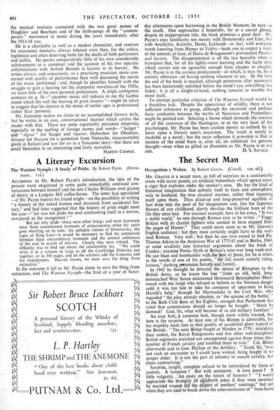A Literary Excursion
The Wanton Nymph : A Study of Pride. By Robert Payne. (Heine- mann. 2 I S.) ACCORDING to Mr. Robert Payne's introduction, the idea of the present work originated in some quite remarkably confused con- versations between himself and the late Charles Williams over glasses of sherry in a Ludgate Hill coffee-house. The letter had speculated —if Mr. Payne reports his friend aright—on the possibility of writing " a history of the naked human soul divorced from accidental his- tory," and had later suggested that the history of pride might meet the case—" for was not pride the soul confronting itself in a mirror, overjoyed at the recognition ? " But not only pride—there were other things, and most important were those concentrated moments of consciousness when the spirit goes wheeling on its own: the epileptic visions of Dostoievsky, the rages of King Lear—it would be necessary to find the connection between these extraordinary moments and the normal ambiences of the soul in search of mirrors. Clearly they were related. The difficulty was to find out where the relationship lay. "We could write it in a volume as large as all the Cambridge Histories put together, or in 300 pages, and let the scholars add the footnotes and the impediments. Heaven knows, we must save the thing from extinction."
In the outcome it fell to Mr. Payne alone to save the thing from extinction, and The Wanton Nymph—the fruit of a year of Satur- day afternoons spent burrowing in the British Museum, he says—is the result. One approaches it hopefully, for at a casual glance, despite its inappropriate title, the book promises a great deal. Mr. Payne's easy familiarity not merely with Dostoievsky and Lear, but . with Aeschylus, Aristotle, Dante, Eckhardt—in fact, with everyone worth knowing from Homer to Valery—leads one to expect a work of the interest, at least, of Denis de Rougemont's provocative Passion and Society. The disappointment is all the less bearable when it transpires that, for all his lightly-worn learning and the facile style which carries one on agreeably enough from chapter to chapter, Mr. Payne is in the curious predicament—of which, it may be, he is entirely oblivious—of having nothing whatever to say. By the time the end of the book is reached, although panorama after panorama has been dexterously unfolded before the mind's eye, everything has faded ; it is all a sleight-of-hand, nothing remains to trouble the mind itself.
To attempt particular criticism of The Wanton Nymph would be a thankless task. Despite the appearance of solidity, there is not sufficient substance to grasp, although the recurrent and perhaps basic confusion between the myths of Narcissus and Prometheus might be pointed out. Selecting a theme which demands the exercise of all the resources of the theologian, or at the very least of the psychologist, Mr. Payne has been content merely to embark by its leave upon a literary man's excursion. The result is nearly as readable as a novel ; but the main reflection it provokes is that in matters of the mind there is, after all, no substitute for genuine thought—even when so gifted an illusionist as Mr. Payne is at our


































 Previous page
Previous page